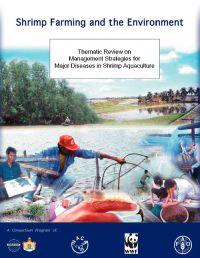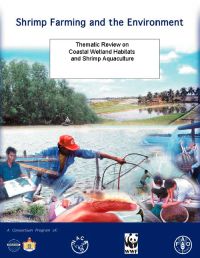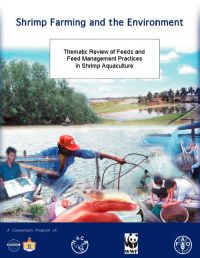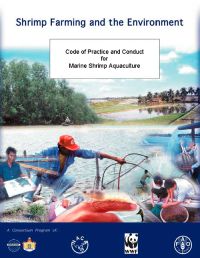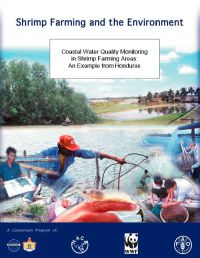This document presents the report of the Expert Workshop on Management Strategies for Major Diseases in Shrimp Aquaculture. The report includes summaries of fifteen national review papers on the history and current national status of major shrimp diseases, including their socioeconomic impacts and an evaluation of the successes and failures of state and private sector interventions to solve major disease problems and to develop more sustainable shrimp culture industries, and four thematic reviews.
This review documents the status of shrimp aquaculture in relation to mangrove forest ecosystems. The environmental, social and economic impacts of shrimp farming are discussed, with examples covering both the negative and positive aspects of the sector. The review considers interventions and other activities to improve the sustainability of shrimp farming in the context of coastal zone management and the protection of mangrove ecosystems. The effectiveness of these interventions is considered in the light of experience based on case studies.
This paper reviews feeds and feed management practice in shrimp aquaculture and assesses the trends and environmental implications of feed use. Particular attention is given to the use of fish meal in shrimp diets and water pollution caused by feeds. The review identifies practices at farm, manufacturing and ecosystem levels that can reduce environmental impacts associated with the use of shrimp feeds. Trends in the use of alternative ingredients to replace fish meal are also considered.
The rapid expansion of marine shrimp aquaculture in many tropical developing countries has proceeded without effective environmental regulation. Most countries with shrimp farming do not have an established regulatory apparatus to monitor and enforce environmental and socioeconomic standards. Therefore, voluntary codes of conduct are a possibility for improving overall management and possibly profitability of the marine shrimp aquaculture industry until effective governmental regulation is implemented. This paper reviews the status of existing codes of conduct for shrimp farming.
Various substances in shrimp farm ponds can contaminate waters, including nutrients, metabolic wastes, veterinary chemicals, and suspended soil particles from erosion. This report discusses ways to monitor these aspects of water quality, which is important from two standpoints for shrimp farmers. Incoming water used top supply shrimp ponds must be healthful and free of toxins to protect the growing shrimp, and effluent must be clean enough to avoid harming aquatic ecosystems and water quality standards downstream.
